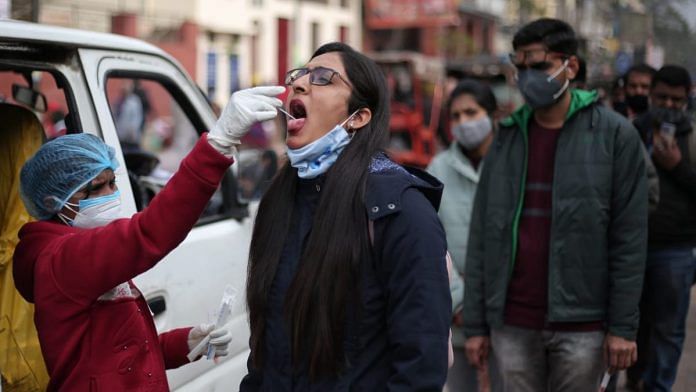One of the more astonishing things that scientists learned from deliberately exposing volunteers to Covid-19 was that nearly half of them never got infected — even when the virus was introduced directly into their noses. More surprising still, these were people who hadn’t been previously infected or vaccinated. This so-called challenge trial was originally conceived as a way to speed up vaccine testing, but ended up as a window into the dynamics of the virus.
Two years into the pandemic, about half of Americans still haven’t had a documented infection according to some estimates. Without more in-depth study, it’s hard to know how many tested positive on antigen tests at home, had had asymptomatic infections, or perhaps had mild ones that they brushed off as a cold without getting tested. But the challenge trial and studies of household contacts show some people are hard to infect. In one study, only 38% of unvaccinated people living with an infected person caught the virus. That number was 25% for the vaccinated.
Which raises the question of who is vulnerable to this latest wave, driven by the omicron subvariant BA.2, which is starting to cause cases to rise in the northeastern United States. Experts quoted in last week’s New York Times estimated 45% of Americans had Covid-19 during the omicron wave, and therefore assumed the other 55% would be vulnerable to BA.2.
But it’s probably not that simple. People who should be vulnerable are not getting infected and those who should be immune to omicron are getting re-infected. And the data from the challenge study and household contacts reveal there’s something more than just being careful and vaccinated that’s separating those who are getting infected and re-infected from those who remain Covid-free.
One explanation that’s been floated has to do with common colds. Colds are caused by a whole zoo of viruses, including four coronaviruses — 229E, NL63, OC43, HKU1. A recent study published in Nature showed that people who’ve remained Covid-free tended to have more immune cells known as T cells generated by past brushes with these cold-causing coronaviruses. But other studies have shown the opposite — that having had a recent coronavirus cold can make people more vulnerable to SARS-CoV-2.
Either result is plausible. Immunity stimulated by a similar virus might help block SARS-CoV-2, or might interfere with the immune response by ramping up production of antibodies that don’t quite work against this new threat. “I think there have been very good studies arguing every which way,” says immunologist Danny Altmann of Imperial College London. “I wouldn’t kind of bet my house on the answer.”
To complicate matters, genes influence how our immune systems respond to any given virus — in particular, a group of extremely variable genes called the HLA. They hold the code for proteins that allow cells to signal to the immune system that they are infected and need to be killed. In infected cells, HLA proteins can stick to parts of the virus, and display them on the outside of a cell, like a target.
The HLA system is like a mission control for the way the immune system is programmed, says Altmann. It’s the most varied part of the human genome. Each of us makes different HLA proteins that will display different parts of the virus as targets — and that will prompt the production of immune cells, called T-cells, that attack different parts of the same virus.
Earlier studies suggested people with certain types of HLA genes are less likely to get symptomatic Covid. Another study identified genetic patterns that leave some vaccinated people prone to severe infection with omicron. Overall, people more prone to one pathogen can be more resistant to others.
There’s a reason evolution favors diversity for pathogen protection in a way it doesn’t for predator protection. Most animals will face the same predators over and over, so they’re more likely to pass on their genes if all their offspring have an optimal defense — whether it’s speed or shells, spines or toxins. But pathogens are an ever-shifting threat, so animals that succeed in passing on the most genes are those that produce immunologically diverse offspring, thus upping the odds that at least some of them will survive whatever plagues come along.
There are also external variables that influence the immune system. For example, animals under certain kinds of stress are more prone to infectious disease.
It would be wonderful if half of humanity had natural resistance to all past and future variants of SARS-CoV-2 and scientists could study them to figure out how to mimic it. But it may turn out that different people are vulnerable to different variants — that old variants collapse because they run out of susceptible people to infect, but new variants rise because they’ve stumbled on ways to infect those impervious to the last iteration.
This might even explain the mystery of why Covid waves rise and fall when they do. A few scientists suggested as early as the autumn of 2020 that human heterogeneity can explain why pandemic surges start to ebb when only a fraction of people have become infected. It’s certainly worth figuring out. The only way to effectively fight the virus is to better understand it, and us. – Bloomberg.
Also read: Modi govt goes all out for bumper footfall in 1st Amarnath Yatra post-370 scrapping & Covid



